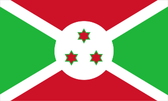
Call 0330 880 3600 Calls may be monitored or recorded. Opening Times.
- TRAVEL INSURANCE
- COVID-19 COVER
- More Options
- Help & Advice
- Existing Customers

Call 0330 880 3600 Calls may be monitored or recorded. Opening Times.

Need help?
UK Customer Services0330 880 3600*
Open Monday to Friday 9:00am to 6pm, Saturday 8:30am to 4pm and closed Sundays.
*Calls are recorded for training and quality purposes.

Official name: Republic of Burundi
Capital city: Gitega
Languages spoken: Kirundi, French, Swahili
Population: Around 13 million
Currency: Burundian franc (BIF)
Time difference: GMT+2
Driving side: Right
Climate: Equatorial near Lake Tanganyika, mild highlands inland; two rainy and two dry seasons
Burundi is a small, landlocked country in East Africa, bordered by Rwanda, Tanzania, and the Democratic Republic of the Congo. Though one of the world’s poorest nations, it offers a rich cultural heritage and scenic landscapes. Visitors are often drawn to the shores of Lake Tanganyika, the lush highlands, and vibrant local traditions. However, political instability and security concerns mean travellers should carefully check the latest FCDO advice before making plans.
Burundi’s terrain is mostly hilly and mountainous, with fertile plateaus and the deep waters of Lake Tanganyika at its lowest point (772 m). Mount Heha, rising to 2,670 m, is the country’s highest peak. The equatorial climate near the lake can feel hot and humid, while the central plateau enjoys more temperate conditions. The country experiences two rainy seasons (February-May and September-November) and two dry spells (June-August and December-January).
Infrastructure is limited, and most visitor accommodation is found in Bujumbura or Gitega. Roads outside main towns can be difficult, particularly during the rainy season. Taxis are available in the capital, but long-distance public transport is risky. Crime, particularly muggings and theft, is a concern in urban areas. A nationwide curfew is sometimes enforced. All but essential travel to parts of Burundi is discouraged - travellers should check FCDO advice before departure.
A valid passport is required. Most visitors need a visa, which is best obtained in advance, though limited visas may be available on arrival at Bujumbura airport if arranged through an agency. Yellow fever vaccination is mandatory. The UK does not have an embassy in Burundi; consular assistance is provided through the British Embassy in Kigali, Rwanda, or other regional missions.
The currency is the Burundian franc (BIF). Local currency use is widespread, and foreign cards are rarely accepted outside major hotels. Banking facilities are limited and travellers are advised to carry cash (US dollars or euros). Money should only be exchanged at authorised banks or hotels.
Medical facilities are very limited and often lack supplies. Travellers should have comprehensive medical insurance that includes evacuation. Risks include malaria, yellow fever, cholera, and other insect-borne diseases. Bottled or boiled water is strongly advised. Vaccinations for yellow fever, hepatitis A and B, typhoid, rabies, and routine boosters are commonly recommended.